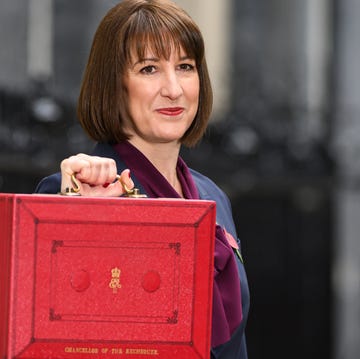Making the decision to move in together is a milestone in most relationships. While some not-so-sweet quirks often come to light in the early days – one of your is incapable of sleeping past 6am, the other hogs the TV remote – the prospect of building a future together is an exciting one.
But amid the thrills and spills of falling in love, when partners commit to cohabitation it’s a good idea to take steps to protect what each person is bringing with them. With the average age of marriage now at 32 for men and 30 for women, according to ONS figures, there’s a higher chance that partners will have built up their own assets ahead of committing to a long-term relationship – and there might be a sizeable difference in their value.
And when there are children from previous relationships involved, it’s also important to consider inheritance issues when organising your finances as a couple.
It’s less romantic than setting up a shared Netflix account, but taking the time to protect yourself can provide peace of mind and clarity for everyone, whatever the future holds. It also means there’s less chance of heartache (at least of a financial sort) later on.
We asked the experts for advice on handling some of the most common scenarios, so you can have peace of mind now and hopefully no nasty shocks to come.
The blended family
Anna, who has two grown-up children from her first marriage, is marrying James, who also has grown-up children from his previous marriage. The couple want advice on how to arrange their wills so that they can pass their money and property on to each other, but also make sure that the children get their fair share of their estates.
The potential problem
In most situations, couples leave the bulk of their estates to each other, using what’s known as ‘mirror wills’, meaning that when one dies, their partner inherits everything. In blended families, the children of the partner who has died would then have to wait until their parent’s partner dies to get their share of their parent’s estate. However, there’s nothing to stop the surviving partner from later changing their will to benefit their own side of the family or selling property, spending money or favouring their own children by way of gifts.
"The notion of giving everything to your spouse also introduces the risk that if the survivor remarried or began a new relationship with someone else, that new person may consider they have a right to the estate of the survivor, thereby depriving the deceased’s own children of their inheritance," says Elisabeth Squires, director and private client solicitor at Britton & Time solicitors.
The solution
‘This is a really common situation in blended families and one that often leads to acrimonious disputes if not properly planned for,’ says Marcus Parker, partner in the trust and probate litigation team at Stewarts law firm. "It’s crucial to take legal advice when drafting wills. Inevitably, it will involve having trusts set up to provide the surviving spouse with access to the other’s assets during their lifetime – for example, the money from any sources of income and the ability to live in property owned by the other. The capital would ultimately pass to their respective children or in an agreed way.
"If this planning is neglected, there may still be steps that can be taken, such as challenging the will, but it’s crucial to seek advice on this at an early stage from an experienced trust and probate litigator."
Broadly speaking, trusts are added or included in a will to state how assets can be managed and passed on to heirs and can be organised by a solicitor.
The house buyers
Alexis and Jessica are buying their first home together. Thanks to an inheritance, Alexis has a £100k deposit to put into the pot, while Jessica has £10k. What happens if they later split up and sell the house?
The potential problem
"If Alexis and Jessica purchased the property as joint tenants, it means they own the property jointly, in equal shares, irrespective of who contributed what and the source of the funds,’ says Toby Atkinson, partner at Stewarts law firm. In that situation, the net proceeds of the sale of the house would be divided equally between the two of them, meaning that Alexis will have lost out financially.
The solution
There’s a way Alexis can protect her larger deposit, says Toby. "The alternative, and far better option for Alexis, would be for them to buy the house as tenants in common," he says.
This means that although they own the property jointly, they can enter into a declaration of trust to record their specific shares in the equity of the property, reflecting their respective financial contributions. In this case, the declaration of trust should state that Alexis was to receive 91% of the net sale proceeds and Jessica was to receive 9%. Their solicitor can set up the tenancy in common (TIC) agreement during the house purchase process. If a couple have already bought a house jointly and wish to change to a TIC agreement, the form to do so is available at gov.uk.
If the pair were married, then the family home would be given special treatment by the Family Court, explains Toby. "This means that, however it’s owned (including when it's held in one party’s sole name), the Family Court generally sees little relevance in this when it comes to dividing the assets if the couple decide to get a divorce."
He adds: ‘The court’s approach to resolving disputes between unmarried couples is very different, and the way in which the property is held will be highly relevant to a dispute about ownership."
The young romantics
Julia bought a one-bedroom flat a few years ago. Her boyfriend, Finlay, who had been renting with friends, recently moved in with her. What rights, if any, might Finlay have over Julia’s flat in the future?
The potential problem
If Julia and Finlay were to split up, it would make a sad situation even worse if Finlay were to claim that he was owed a share in the home they had made together but which Julia had originally bought. Sarah Havers, senior associate at Stewarts, explains: "Cohabiting couples do not enjoy the same legal rights as those who are married or in a civil partnership, even if they have lived together for a long period of time and have children. On that basis, if Finlay had made no financial contribution to the flat, he would have no right to a share of the property, unless he was able to show he has acquired a “beneficial interest” in the property."
A beneficial interest could be claimed if Finlay can prove that he thought the intention was that they shared ownership of the flat together, says Sarah. For example, if Julia often says, or messages, things such as: ‘Please treat this property as much as yours as it is mine’ or ‘What’s mine is yours’.
This could be compounded if Finlay has been paying some or all of the monthly mortgage instalments and making home improvements: the more significant and expensive the home improvements, such as an attic conversion, the stronger his case.
The solution
If Julia continues to pay the mortgage from her bank account and Finlay signs a rental agreement showing that he is a tenant of Julia’s, then that would be strong evidence that the couple never intended for Finlay to share in the ownership of the property.
A template for a shorthold assured tenancy is available to download from the ‘How to rent’ section of gov.uk. Alternatively, legally approved agreements are available to buy from WHSmith or Amazon.
As for home improvements, Julia could argue that Finlay’s contributions merely showed they were making their lives together, rather than proving she was going to give him part of the property.
The newly-weds
Daniel already owned a house when he married Talia, who moved in with him. After two years, Talia ended the marriage and moved out. Given that they were married, does Talia have any claim over Daniel’s house?
The potential problem
Assets acquired during a marriage tend to be split between the two people in the event of a divorce, irrespective of who earned or inherited them, so that each person gets a fair settlement that meets their financial needs. Assets acquired before marriage can sometimes be treated differently, but it depends if they were used during the marriage – for example, an inheritance that was used to buy the family home.
"If Daniel and Talia lived in the same property, then Daniel’s house would be seen as the family home and, most often, this asset is divided 50:50, regardless of ownership," says Theresa Wright, solicitor at Britton & Time. But, she adds, when it comes to dividing marital assets, there’s the ‘short marriage’ principle and the ‘long marriage’ principle. While there isn’t a legal definition of either, a long marriage would typically last five or more years with a shared home and children.
"In broad terms, in a shorter marriage you can almost 'get out what you put in', whereas in a longer marriage there’s the presumption of equality, where all marital assets are divided equally," says Theresa. "If Talia moved in when she married Daniel, the period of two years is likely to constitute a short marriage, so Daniel could argue that his property was not a marital asset, as it was in his sole name, and as such it should not be divided equally."
However, if Talia had been making payments towards the mortgage and/or other household bills, she may try to argue that she has some entitlement to the property. This is unlikely to be 50:50, says Theresa, and could be decided by a court if the case proceeds all the way to a final hearing.
The solution
A prenuptial agreement, while not legally binding, could be used in court to allow Daniel entitlement to all or most of the home. But, Theresa adds: "On the other hand, if a prenup left Talia in a 'predicament of real need' (because Daniel kept the house and Talia had no other assets or income), then the court would likely order some limited financial provision to be made for her."
The deposit borrowers
Fenella used £50k lent to her by her mother, Joy, as the deposit to buy a house with her boyfriend, Freddie (who doesn’t have money for a deposit himself). Joy wants to ensure she will get her money back if the couple later split and sell the house.
The potential problem
Having lent her daughter the money to buy a home, Joy stands to lose out if the happy couple later split up and Freddie demands half of the proceeds from the sale of the house.
The solution
"The best thing for Joy to do would be to encourage them to purchase the property as tenants in common and enter into a declaration of trust, stating that Fenella has a 100% share in the equity," says Toby Atkinson. "This will ensure that the £50k deposit, and any growth on it, remains Fenella’s property and Freddie can’t make a claim against it."
A cohabitation agreement that records how the house was purchased and that the funds were loaned to Fenella by her mother, as well as stating that Freddie is not to have any interest in it, would also be advisable, adds Toby. "Provided they’re correctly drafted, cohabitation agreements are legally binding contracts that, if necessary, are enforceable by a court." For added peace of mind, Joy and Fenella could draw up a loan agreement for repaying the £50k.
‘We’ve always been open about our finances’
Within six months of meeting, Amber Harrison, 55, and her now husband, Kevin, had taken a leap of faith, buying a four-bedroom home together.
Kevin had the larger deposit, says Amber, who co-owns award-winning nature writing bookshop FOLDE, in Shaftesbury, Dorset. "We had the solicitor draw up an agreement that we’d keep those proportions should we sell the house before we got married."
The couple bought as tenants in common with a 70:30 split, reflecting the differences in their respective deposits. "It seemed like the fairest and most logical way to do it," says Amber. They arranged it so their mortgage payments would also be based on how much they earned, so each was paying the same proportion from their take-home salary.
The couple are now married and own another home together on an equal basis. Amber says their willingness to discuss money right from the start was a great sign. "We’ve always been open about our finances and I think it’s a good indicator of how healthy the relationship will be if you’re able to discuss everything freely," she says. "We’ve never argued about money."
"I don’t want to lose what my grandparents gave me"
Nikki Knight, 38, bought her home with her husband, Ollie, as tenants in common with unequal shares in the house.
‘We were renting a home and running out of space when we found a four-bedroom house that was perfect,’ says mum-of-two Nikki, who runs the Unicorns, Dinosaurs and Me lifestyle blog. Thanks to an inheritance from her grandparents, Nikki had a £40k deposit, while her husband’s better-paid job helped secure the mortgage.
The pair now own the property 60:40 and have set up a declaration of trust that not only protects their shares in the event of a split, but also protects them from being used for care-home costs for the other. The couple have also ensured their shares will go to their children in trust. ‘It’s reassuring to know that whatever happens, I’m not going to lose what my grandparents gave me,’ says Nikki.
















